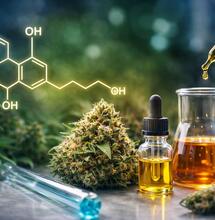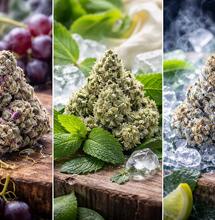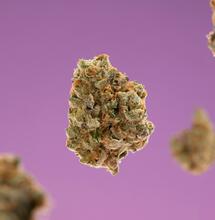Vaping Craze: How to Make Cannabis Oil for Vape Pens

One of the reasons why folks turn to vape is, of course, it could stone you more so than your standard king roll.
Vaping has been all the rage in the last few years. It's become one of the favorite ways to consume weed, especially among younger generations. Vaping works for both THC and CBD. The smoke is cleaner, and the effects are stronger.
In 2019, in California, the U.S. largest recreational market, cannabis concentrates sold as vapes—for the first time in history—outsold flowers. According to figures from BDS Analytics, vapes outdid with 37 percent vs. 33 percent of total sales. Since then, the market has continued to grow, extending to include an array of new and even better vape products. Typically, weed vaporizers encompass pens that work with no-high CBD, concentrates, vape oil, and also dry flowers. Vaporizers heat the oil into vapor which gets you high, without releasing the pungent smell characteristic of marijuana. Vape pens are also easy to transfer and work well for those who seek to conceal their getting high habit. The only way for someone to find out if you were high from vape is if they did a urine test for the presence of THC. It's generally younger people who put their hands on vapes. However, the trend has pushed the entire industry in this direction.
Stronger high
One of the reasons why folks turn to vape is, of course, it could stone you more so than your classic king roll. According to one study, vaping produces "higher concentrations of THC in blood compared with equal doses of smoked cannabis." More research has also pointed out that people, especially users around the age of 30, are keen to seek weed accessories that will result in a greater high.
DIY: How to make cannabis oil for vape pens?
In states where cannabis is legal, users are able to purchase liquid THC-filled cartridges. Many of these smoking gadgets are versatile in function, meaning that the brand that sells smoking pens does not necessarily have to offer marijuana pods. Just take Juul, one of the most famous e-cigarette devices. Users can re-fill their cartridges with cannabis juice from someone else. Or, if you are up for the challenge—you can make cannabis oil for vape pens yourself. It will take less time to create your own vape pens if you do have cannabis concentrates. Alternatively, you can make use of cannabis flowers, but with that, you have the extra step to decarboxylate the weed material before proceeding to make the substance for vaping.
Ingredients:
- 1 gram of high-grade cannabis concentrate OR 5-10 grams of flower. Use less flower if it's high quality. Use more if it's of lower quality. As per reference, an eight oz (3.5g) of weed should produce about 35-60 mL of vape juice.
- For solvent: Either a mix of polyethylene glycols (PEG) like PEG400, propylene glycol (PG) and vegetable glycerin (VG) OR cannabis-derived terpenes.
- High percentage alcohol like Everclear.
Other stuff you'll need:
- 2 glass jars
- Strainer
- Baking sheet
- Freezer
- Oven
- Stovetop
- Cooking pot (for boil)
- Aluminum foil
- Baking sheet
- Dropper bottles
- Syringe
Before starting Leave the two glass jar in a freezer for 2 hours before the extraction process begins. Don't use rubbing alcohol. Use a stovetop or a hot plate to boil off any remaining solvent, even when you use alcohol solutions like Everclear.
A woman is seen refilling her vaping device with new juice.
Step 1: Decarboxylate If you are using flowers, you will still need to decarboxylate first so that you unleash its THC contents. Preheat the oven to 240°F (115°C). Crumble the weed into a rimmed baking sheet evenly on the entire surface. A half an hour of baking your weed should do it. To prevent churning your buds, mix them every ten minutes. When you're done with this part, you can grind the buds. Use a herb grinder or just quickly stir it in a food processor. Don't overdo it. You don't need powder, but a small chunky coarse mixture. If you are going with concentrates, you don't need this step.
Step 2: Soak in alcohol. In one of the glass jars you previously put in the fridge pour in the baked buds. Cold helps separate lipids from cannabinoids and terpenes. But the critical step here is to pour just enough alcohol where you immerse the buds. Be gentle with how you handle the mixture. Swish back and forth without making too much movement. Put the jar back in the fridge for a couple of minutes.
Step 3: Pour the mixture into another jar. Take the other jar, cover it with cheesecloth and pour through the mixture. Squeeze and squeeze until you get to the last drop of your medicine.
Step 4: Evaporate the remaining alcohol. Fill the pot with about 4 inches of water and place in it the jar filled with liquid. Keep it in for an hour at 150-160°F. This process will help evaporate any remaining alcohol and result in a fine cannabis concentrate.
Step 5: Add PEG/VG/PG solution or add Terpenes. Once you've managed the alcohol part, you can proceed with adding thinning agents of your choice. About 20-25mg of any of them would work. If you add more agents, it will make the oil easier to vaporize, but it will also become less intense on THC and have more impact on the throat. In the end, it comes down to you to experiment a bit on this part and find the dosage that works best for your throat—and your high. Whether you use ready-made blends of PEG400, it's super easy to produce the gooey substance for your e-pens. 1 ml of liquid for every gram of concentrate would do it.
With the other solutions, like vegetable glycerine extraction, there are several ways to go. You can try it out with different dosages. And you can even opt to passively prepare the e-juice over a period of 2-3 months. For this, you decarboxylate the weed, put it in a jar saturated with VG, stir the mixture and leave it on the shelf for a month. After a month, add a fresh tablespoon of VG, stir again, and leave the jar for another month. In the second month, you can extract the liquid in another jar. That is if you don't rush with your THC juice.
One warning if you work with the faster method where you actually add in and evaporate alcohol. Try not to blow your kitchen cooking THC oil. Alcohol is a flammable substance, so you need extra caution on step four, where you proceed with evaporating. In case you want to take extra care in handling any remaining smell and taste of marijuana, add flavor to the mixture based on your preferences.
When your vape liquid is all done and gooey, put it in cartridges with a syringe, and it's time to vape some.



